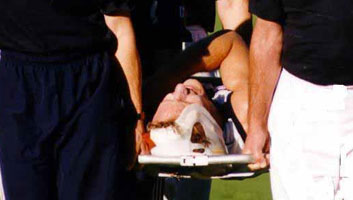
Concussion is a hot topic when talking about the management of injuries in sport.
Many of us would be aware of the recent changes to the AFL rules regarding concussion and the subsequent automatic substitution/sidelining of a player.
What is Concussion?
Concussion is defined as pathophysiological process affecting the brain caused by a traumatic force. This can be caused by direct blow to the head, face or neck or as a result of a severe blow to the body with a transmitting force. Concussion’s symptoms are a reflection of a short term functional disturbance rather than permanent structural change. In other words the brain connections are disturbed causing these transient symptoms but they are not necessarily broken.
What should happen with a suspected concussion?
When a possible concussion is suspected the individual should be medically evaluated onsite using standard emergency management procedures. This includes ruling out cervical spine injury. If no team medical staff are present, the player should be left until medical help arrives. It is also important to note that concussion can occur without a loss of consciousness. If a conscious player removes themselves from the field they should be referred to timely medical assistance. There are several concussion tests but the most widely used and internationally recognized is the SCAT2. Once a player tests positive for concussion they should not be permitted to return to the field despite age or sporting level.
What to look for?
Following a possible concussion the individual should be monitored for the next 24 hours. Signs to be suspicious of include drowsiness, vomiting, worsening headache, pins and needles/numbness in limbs or changes in behavior. The individual should be supervised following concussion including waking every 2 hours during the night. A player should not be allowed to sleep during the day of the concussion incident.
What should I avoid if concussed?
The consumption of alcohol, and sleeping tablets should be avoided as well as driving and strenuous activity.
How Long do concussions symptoms last?
Most concussions resolve in 7-10 days although this may be longer in children and adolescents. Some people may develop post concussion syndrome experiencing ongoing symptoms for several weeks. Patients should undergo screening if this occurs but most settle with adequate rest.
Are there risks of repeated concussion?
As this stage there is no consensus on the long term effects of repeated concussion but there have been some studies and individual case studies indicating possible damage and functional deficits from repeated concussions
Is there a way to prevent concussion?
Currently there is no evidence that the use of helmets reduces the incidence of concussion. Probably the most effective way that concussion can be reduced is by adapting rules to protect the athletes head and educating our players on the safety of themselves and others.
